funding
Auto Added by WPeMatico
Auto Added by WPeMatico
End Game Interactive CEO Yang C. Liu has a refreshingly straightforward description of what he and his co-founder Luke Zbihlyj are up to: “We’re just building games. And to be honest, we don’t know what we’re doing.”
Despite this self-proclaimed ignorance, End Game has just raised $3 million in seed funding from an impressive group of investors: The round was led by the game-focused firm Makers Fund, with participation from Clash of Clans developer Supercell, Unity CEO David Helgason, Twitch COO Kevin Lin, Twitch VP Hubert Thieblot, Danny Epstien and Alexandre Cohen of Main Street Advisors and music executive Scooter Braun.
Liu told me that he and Zbihlyj got their start by building websites tied to existing games, such as PokéVision, a site for finding Pokémon in Pokémon GO. However, they were inspired by the success of simple, browser-based multiplayer games like Slither.io to create games of their own — first Zombs.io, then Spinz.io, then Zombs Royale.
Altogether, End Game says its titles have attracted more than 160 million players, with 1 million people playing in a single day. Zombs Royale, in particular, seems to have been a hit — the battle royale game (where a single map can pit up to 100 players against each other) was one of 2018’s most Googled games in the United States.
Liu said the team’s success convinced them to focus their efforts on game development: “Do we want to make products that people simply use, or games that people think about out when they’re going to school, or going to work, or dream about?”

Zombs Royale was supposedly built in less than four weeks, but Liu said that after its launch in early 2018, the team spent most of the year maintaining and scaling the game. Then 2019 was all about building a team and creating the next game, Fate Arena, a title in the new Auto Chess genre that’s supposed to launch on PC, mobile and other platforms soon.
Liu noted that unlike End Game’s previous work, which featured simple 2D art (“On Zombs Royale and Spinz, I did the art, and it’s terrible”), Fate Arena will feature a “3D, high-fidelity art style.”
But even as the company’s games start looking a little less primitive, the goal is still to develop and iterate quickly. Liu said he hopes to fund “many tries” at building other cross-platform, multiplayer games with this seed round.
“We pride ourselves on rapid experimentation,” he said, adding that the key is “not biting off more than we can chew. We design [our games] to scale from the beginning. We don’t necessarily need to be World of Warcraft, where you need to make 100 quests as the baseline. We’re focused on games with a small starting point that can scale into something much bigger.”
Supercell Developer Relations Lead Jaakko Harlas made a similar point in a statement included in the funding announcement:
Many companies are quick to point out how fast-moving they are. Then you come across a team like this and realize what being lean and moving fast really means. Yang, Luke and the team have already shown that they can ship accessible games that showcase a real flair for fun, and we look forward to supporting them in their quest for the next big hit game.
Powered by WPeMatico
It wasn’t a fad. Yolo became the country’s No. 1 app just a week after launch by letting teens ask for anonymous replies to questions they posted on Snapchat. But nine months later, Yolo is still in the top 100 iOS apps and has 10 million active users. Now it’s safeguarding the app from predators while revealing a smart new feature for spinning up anonymous group chats, powered by $8 million in fresh funding.
“What we are trying to build is a new kind of network where there’s a fluidity to identity,” Yolo co-founder Greg Henrion tells me. “We weren’t sure if Yolo was here to stay, but we’re still ranking well and there seems to be a real opportunity in anonymity starting with Snapchat Q&A.”
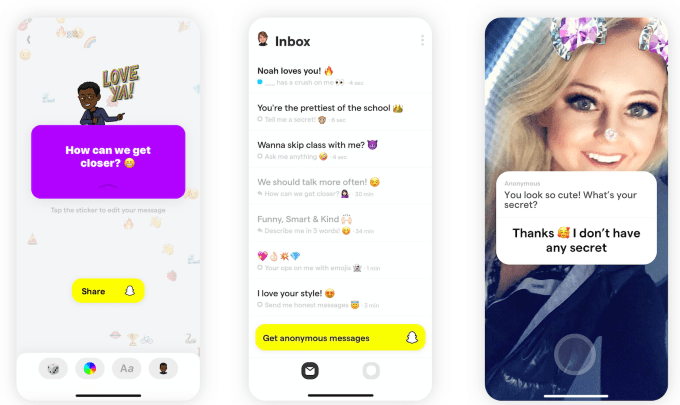
Yolo is the first big win for Snapchat’s Snap Kit platform that lets developers piggyback on its login, Bitmoji avatars, stickers and Stories. This lets tiny development teams build apps that hundreds of millions of people, teens in particular, can instantly sign up for in just a few taps. Another Snap Kit app for meeting new people called Hoop recently spiked to No. 2 on the charts
We haven’t seen this kind of social platform success since Zynga’s empire rose atop Facebook. Spawning more blockbusters like Yolo could ensure that a Snapchat account is a must-have utility for the next generation.
“For two weeks we basically didn’t sleep,” Henrion recalls about the chaos he and co-founder Clément Raffenoux endured after Yolo shot to No. 1 last May. “You’re trying to stay afloat. It was very, very wild.”
The basic premise of Yolo is that you write a question like, “Who’s my celebrity look alike?”, “What do people really think of me?” or “How could I be nicer?” You’re then switched over to Snapchat, where you can post the question in your Story or messages with a link back to Yolo. There, people can anonymously leave a response; you can post that and your reply with another post on Snapchat.

Yolo co-founder and CEO Greg Henrion, in real life and Bitmoji
The result is that friends and followers feel comfortable giving you real talk. They don’t have to sugarcoat their answers. And that makes people race to open Yolo each time they get a message. Yolo has seen 26 million downloads across iOS and Android globally, with nearly 70% in the U.S, according to Sensor Tower.
Other anonymous apps like tbh (acquired by Facebook) and Sarahah (kicked off the app stores) quickly faded, and others eventually imploded due to bullying, like Secret and YikYak. Although tbh hit No. 1 in September 2017, it was out of the top 500 by November. It seems a combination of inherent virality via Snapchat, easy user acquisition via Snap Kit and sharp product design has given Yolo some staying power. It still managed 2.2 million downloads last month versus a peak of 5.5 million in its first month back in May 2019.
 That June, Yolo quietly raised a $2 million seed round thanks to its sudden success. The team had been grinding since 2017 on a video reactions app called Popshow funded by a small pre-seed round from SV Angel, Shrug Capital and Product Hunt’s Ryan Hoover. They’d previously built music video-making app Mindie that eventually sold to influencer collective Shots Studios. Popshow never caught on, so the team began experimenting on Snap Kit, building a more official Q&A feature for Snapchat than predecessors like Sarahah and Polly. Then, boom. Days after launch, Yolo’s usage exploded.
That June, Yolo quietly raised a $2 million seed round thanks to its sudden success. The team had been grinding since 2017 on a video reactions app called Popshow funded by a small pre-seed round from SV Angel, Shrug Capital and Product Hunt’s Ryan Hoover. They’d previously built music video-making app Mindie that eventually sold to influencer collective Shots Studios. Popshow never caught on, so the team began experimenting on Snap Kit, building a more official Q&A feature for Snapchat than predecessors like Sarahah and Polly. Then, boom. Days after launch, Yolo’s usage exploded.
But to keep users interested, Yolo needed to evolve. That would require more funding for the eight-person team split between Snapchat’s home of Los Angeles and Henrion’s home of Paris.
The concept of a social app where users could shift between full anonymity and representation via avatar attracted its $8 million Series A to invest in product and engineering. The round was led by Thrive Capital, Ron Conway’s A.Capital, former TechCrunch editor Alexia Tsotsis’ Dream Machine (also in the seed round), Shrug, Day One, Goodwater, Knight VC, ex-Facebooker Bobby Goodlatte, Twitter co-founder Biz Stone and SV Angel’s Brian Pokorny.
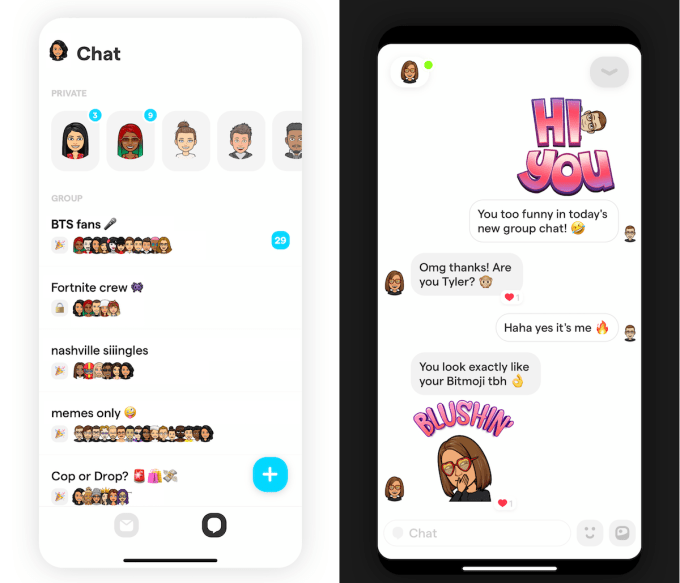
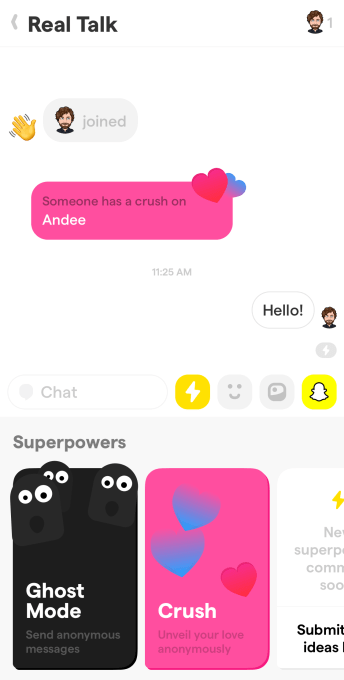 That cash fueled the release of Yolo’s new group chat feature. You can set up a chat room, give it a name and generate an invite URL or sticker you can post on Snapchat, just like its previous question feature. Friends or friends of friends that are already in can join the group chat, represented by their Bitmoji instead of their name. Yolo suggests people join the more open “party mode” chats where their friends are active.
That cash fueled the release of Yolo’s new group chat feature. You can set up a chat room, give it a name and generate an invite URL or sticker you can post on Snapchat, just like its previous question feature. Friends or friends of friends that are already in can join the group chat, represented by their Bitmoji instead of their name. Yolo suggests people join the more open “party mode” chats where their friends are active.
What makes this special is that once an hour, users can tap the Yolo Superpowers button to send a totally anonymous message to the group. More Superpowers are coming, but there’s also an anonymous “Someone has a crush on [name]” message so you can secretly profess your affection to anyone or someone else in the chat.
“The limits of Q&A is that it doesn’t generate real conversation. It’s an ice breaker, but we also want conversations to happen,” Henrion stresses. “‘What do you think about this dress?’ The group chat is more about ‘let’s talk about the dress.’” The chats could be focused on people you actually know offline, or those you share interests with. The option to restrict group chats to either just your contacts or friends of friends “limits the amount of meeting strangers,” Henrion explains. “This is very different from the public communities like Reddit or the dating apps.”
Still, anonymous apps have consistently proven to be havens for cyberbullying and unsafe behavior. Without the accountability of having your name attached, people are free to say awful things. That can be even worse amongst teenagers who might get in trouble for being mean at school but not on an app.
Yolo first focused on messages blocking 10% of overall messages that contained offensive content. That meant blatant hate speech and trolling couldn’t spread through the app. “We’re strict on moderation. When looking at the reviews about bullying, it’s like nothing compared to any other anonymous app. I think we solved 90% of the problem.”
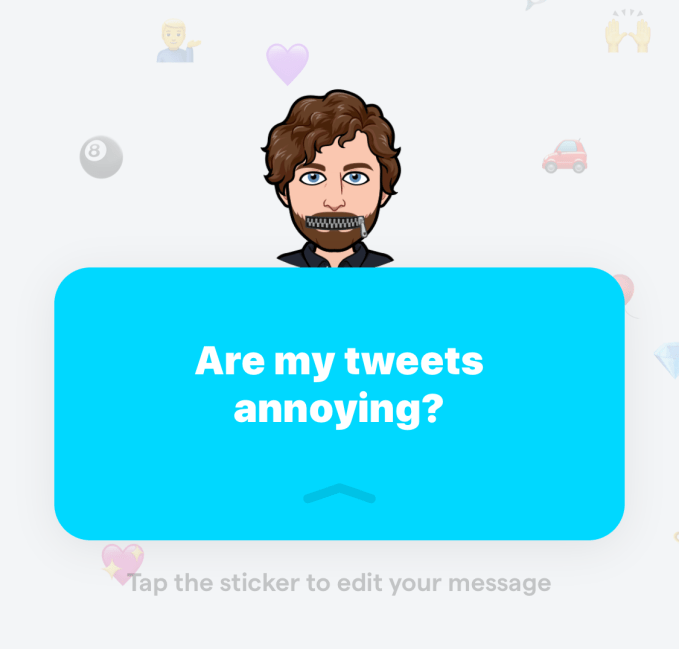
Now it’s working with Snapchat to safeguard the group chats feature. The goal is to ensure Yolo doesn’t actively recommend chat amongst adults to minors and vice-versa. Henrion says this update should roll out soon.
“It’s 2020 and we need to be very responsible” Henrion tells me. “Moderation and growth are the most difficult things to balance. It’s moderation first for sure. We don’t care about growth if it’s not healthy or sustainable.” The new funding also gives Yolo the luxury of pushing back monetization while it focuses on safely adding more users.

By making anonymity more private, Yolo has a chance to sidestep some of the worst elements of human behavior. Making fun of someone has less appeal if there’s no wider audience like trolls exploited in the feeds and comment reels of Secret and YikYak.
That could let the brighter side of anonymity shine through: vulnerability, honesty and deep connections that are enhanced by the absence of embarrassment. With all the change, uncertainty and anxiety that’s part of growing up, teens deserve a place where they can be open with each other and speak their minds. After all, you only live once.
Powered by WPeMatico
Coding and other computer science expertise remain some of the more important skills that a person can have in the working world today, but in the last few years, we have also seen a big rise in a new generation of tools providing an alternative way of reaping the fruits of technology: “no-code” software, which lets anyone — technical or non-technical — build apps, games, AI-based chatbots, and other products that used to be the exclusive terrain of engineers and computer scientists.
Today, one of the newer startups in the category — London-based Gyana, which lets non-technical people run data science analytics on any structured dataset — is announcing a round of £3 million to fuel its next stage of growth.
Led by U.K. firm Fuel Ventures, other investors in this round include Biz Stone of Twitter, Green Shores Capital and U+I , and it brings the total raised by the startup to $6.8 million since being founded in 2015.
Gyana (Sanskrit for “knowledge”) was co-founded by Joyeeta Das and David Kell, who were both pursuing post-graduate degrees at Oxford: Das, a former engineer, was getting an MBA, and Kell was doing a Ph. D. in physics.

Das said the idea of building this tool came out of the fact that the pair could see a big disconnect emerging not just in their studies, but also in the world at large — not so much a digital divide, as a digital light year in terms of the distance between the groups of who and who doesn’t know how to work in the realm of data science.
“Everyone talks about using data to inform decision making, and the world becoming data-driven, but actually that proposition is available to less than one percent of the world,” she said.
Out of that, the pair decided to work on building a platform that Das describes as a way to empower “citizen data scientists,” by letting users upload any structured data set (for example, a .CSV file) and running a series of queries on it to be able to visualise trends and other insights more easily.
While the longer term goal may be for any person to be able to produce an analytical insight out of a long list of numbers, the more practical and immediate application has been in enterprise services and building tools for non-technical knowledge workers to make better, data-driven decisions.
To prove out its software, the startup first built an app based on the platform that it calls Neera (Sanskrit for “water”), which specifically parses footfall and other “human movement” metrics, useful for applications in retail, real estate and civic planning — for example to determine well certain retail locations are performing, footfall in popular locations, decisions on where to place or remove stores, or how to price a piece of property.
Starting out with the aim of mid-market and smaller companies — those most likely not to have in-house data scientists to meet their business needs — startup has already picked up a series of customers that are actually quite a lot bigger than that. They include Vodafone, Barclays, EY, Pret a Manger, Knight Frank and the UK Ministry of Defense. It says it has some £1 million in contracts with these firms currently.
That, in turn, has served as the trigger to raise this latest round of funding and to launch Vayu (Sanskrit for “air”) — a more general purpose app that covers a wider set of parameters that can be applied to a dataset. So far, it has been adopted by academic researchers, financial services employees, and others that use analysis in their work, Das said.

With both Vayu and Neera, the aim — refreshingly — is to make the whole experience as privacy-friendly as possible, Das noted. Currently, you download an app if you want to use Gyana, and you keep your data local as you work on it. Gyana has no “anonymization” and no retention of data in its processes, except things like analytics around where your cursor hovers, so that Gyana knows how it can improve its product.
“There are always ways to reverse engineer these things,” Das said of anonymization. “We just wanted to make sure that we are not accidentally creating a situation where, despite learning from anaonyised materials, you can’t reverse engineer what people are analysing. We are just not convinced.”
While there is something commendable about building and shipping a tool with a lot of potential to it, Gyana runs the risk of facing what I think of as the “water, water everywhere” problem. Sometimes if a person really has no experience or specific aim, it can be hard to think of how to get started when you can do anything. Das said they have also identified this, and so while currently Gyana already offers some tutorials and helper tools within the app to nudge the user along, the plan is to eventually bring in a large variety of datasets for people to get started with, and also to develop a more intuitive way to “read” the basics of the files in order to figure out what kinds of data inquiries a person is most likely to want to make.
The rise of “no-code” software has been a swift one in the world of tech spanning the proliferation of startups, big acquisitions, and large funding rounds. Companies like Airtable and DashDash are aimed at building analytics leaning on interfaces that follow the basic design of a spreadsheet; AppSheet, which is a no-code mobile app building platform, was recently acquired by Google; and Roblox (for building games without needing to code) and Uncorq (for app development) have both raised significant funding just this week. In the area of no-code data analytics and visualisation, there are biggies like Tableau, as well as Trifacta, RapidMiner and more.
Gartner predicts that by 2024, some 65% of all app development will be made on low- or no-code platforms, and Forrester estimates that the no- and low-code market will be worth some $10 billion this year, rising to $21.2 billion by 2024.
That represents a big business opportunity for the likes of Gyana, which has been unique in using the no-code approach specifically to tackle the area of data science.
However, in the spirit of citizen data scientists, the intention is to keep a consumer version of the apps free to use as it works on signing up enterprise users with more enhanced paid products, which will be priced on an annual license basis (currently clients are paying between $6,000 and $12,000 depending on usage, she said).
“We want to do free for as long as we can,” Das said, both in relation to the data tools and the datasets that it will offer to users. “The biggest value add is not about accessing premium data that is hard to get. We are not a data marketplace but we want to provide data that makes sense to access,” adding that even with business users, “we’d like you to do 90% of what you want to do without paying for anything.”
Powered by WPeMatico
Online gaming platform Roblox, now home to 115 million largely Gen Z players per month, announced today it has raised $150 million in Series G funding, led by Andreessen Horowitz’s Late Stage Venture fund. The company will also open a tender offer for up to $350 million of common and preferred shares, it says.
The company has previously offered stakeholders and employees liquidity through periodic secondary offerings, as it believes in its long-term potential. Roblox is also cash-flow positive, according to its CFO Michael Guthrie.
Others participating in the Series G include new investors Temasek and Tencent Holdings Limited, as well as existing investors Altos Ventures, Meritech Capital, and Tiger Global Management.
The funding comes at a period of significant growth for the gaming platform. Just last summer, it was being visited by 100 million users, topping Minecraft, and its developer community of over 2 million actives earned $110 million in 2019 — up from around $70+ million in 2018 and $40+ million in 2017.
Since then, Roblox has further invested in its developer business, with the launch of new tools for building more realistic 3D experiences and a marketplace where creators can sell their own development assets and tools to others, among other things.
Roblox offers a platform for its developers to build upon, similar to the App Store. Many of its most popular games are free, instead monetizing as players spend on in-game items using virtual cash called Robux. Some of its largest games average over 10 million users monthly. Over 10 games have seen more than 1 billion visits.
Players on Roblox often do more than just focus on completing a goal or task — they go online to hang out with friends in a gaming environment. Half of weekly active users go to Roblox to play with friends. In addition, half of Roblox users update their avatar every month.

In recent months, Roblox has also been working to take its platform further outside the U.S. including most notably China. Last year, Roblox entered a strategic partnership with Tencent in an effort to bring its platform and coding curriculum to the region, including by adding support for Chinese languages and running coder camps. Today, Roblox has players and creators in over 200 countries, it says.
As of last year, Roblox was valued at $2.5 billion, with roughly half of U.S. children ages 9 through 12 playing on its platform, according to comScore. This remains true today. In addition, its user base overall skews younger, with over 40% 13 and up.
The company is now valued at $4 billion, The Wall Street Journal reported. (TechCrunch additionally understands this to be true. Roblox isn’t commenting.)
Today, Roblox says its user base is spending a collective 1.5 billion hours per month on its service. And because it’s accessible across platforms, users often move from PC to smartphone to continue to play — a newer trend in online gaming, and one that’s also driving adoption of games like Fortnite, PUBG, and others.
“We are big believers in Roblox’s long-term vision, and are confident in backing the team as they enter this next inflection point,” said David George, General Partner at Andreessen Horowitz, of the firm’s investment. “Roblox is one of those rare platform companies with massive traction and an organic, high-growth business model that will advance the company, and push the industry forward for many years to come,” he added.
Roblox plans to leverage the new funds to continue its growth, including international; further build out its developer tools and ecosystem; and invest in engineering talent and infrastructure.
“We’ve stayed true to our vision of creating a safe and civil place where people come together to create, learn, and have fun, and it’s amazing to see what we’ve built together with our global creator community,” said David Baszucki, CEO and co-founder of Roblox, in a statement. “Looking ahead, we’re doubling down on our commitment to building the most advanced tools and technology to take our creators and players into the metaverse of the future.”
Updated, 2/26/20, 7:30 PM ET with more updated statistics.
Powered by WPeMatico
Laiye, a Chinese startup that offers robotic process automation services to several major tech firms in the nation and government agencies, has raised $42 million in a new funding round as it looks to scale its business.
The new financing round, Series C, was co-led by Lightspeed Venture Partners and Lightspeed China Partners. Cathay Innovation, which led the startup’s Series B+ round and Wu Capital, which led the Series B round, also participated in the new round.
China has been the hub for some of the cheapest labor in the world. But in recent years, a number of companies and government agencies have started to improve their efficiency with the help of technology.
That’s where Laiye comes into play. Robotic process automation (RPA) allows software to mimic several human behaviors such as keyboard strokes and mouse clicks.
“For instance, a number of banks did not previously offer APIs, so humans had to sign in and fetch the data and then feed it into some other software. Processes like these could be automated by our platform,” said Arvid Wang, co-founder and co-chief executive of Laiye, in an interview with TechCrunch.
The four-and-a-half-year-old startup, which has raised more than $100 million to date, will use the fresh capital to hire talent from across the globe and expand its services. “We believe robotic process automation will achieve its full potential when it combines AI and the best human talent,” he said.
Laiye’s announcement today comes as the market for robotic automation process is still in nascent stage in China. There are a handful of startups looking into this space, but Laiye, which counts Microsoft as an investor, and Sequoia-backed UiPath are the two clear leaders in the market.
As my colleague Rita Liao wrote last year, it was only recently that some entrepreneurs and investors in China started to shift their attention from consumer-facing products to business applications.
Globally, RPA has emerged as the fastest growing market in enterprise space. A Gartner report found last year that RPA market grew over 63% in 2018. Recent surveys have shown that most enterprises in China today are also showing interest in enhancing their RPA projects and AI capabilities.
Laiye today has more than 200 partners and more than 200,000 developers have registered to use its multilingual UiBot RPA platform. UiBot enables integration with Laiye’s native and third-party AI capabilities such as natural language processing, optical character recognition, computer vision, chatbot and machine learning.
“We are very bullish on China, and the opportunities there are massive,” said Lightspeed partner Amy Wu in an interview. “Laiye is doing phenomenally there, and with this new fundraise, they can look to expand globally,” she said.
Powered by WPeMatico
Financial services startups raised less money in 2019 than they did in 2018 as VC firms looked to back late stage firms and focused on developing markets, a new report has revealed.
According to research firm CB Insights’ annual report published this week, fintech startups across the world raised $33.9 billion* in total last year across 1,912 deals*, down from $40.8 billion they picked up by participating in 2,049 deals the year before.
It’s a comprehensive report, which we recommend you read in full here (your email is required to access it), but below are some of the key takeaways.

Early-stage deals dropped to a 12-quarter low as deal share globally shifts to mid- and late-stages (CB Insights)
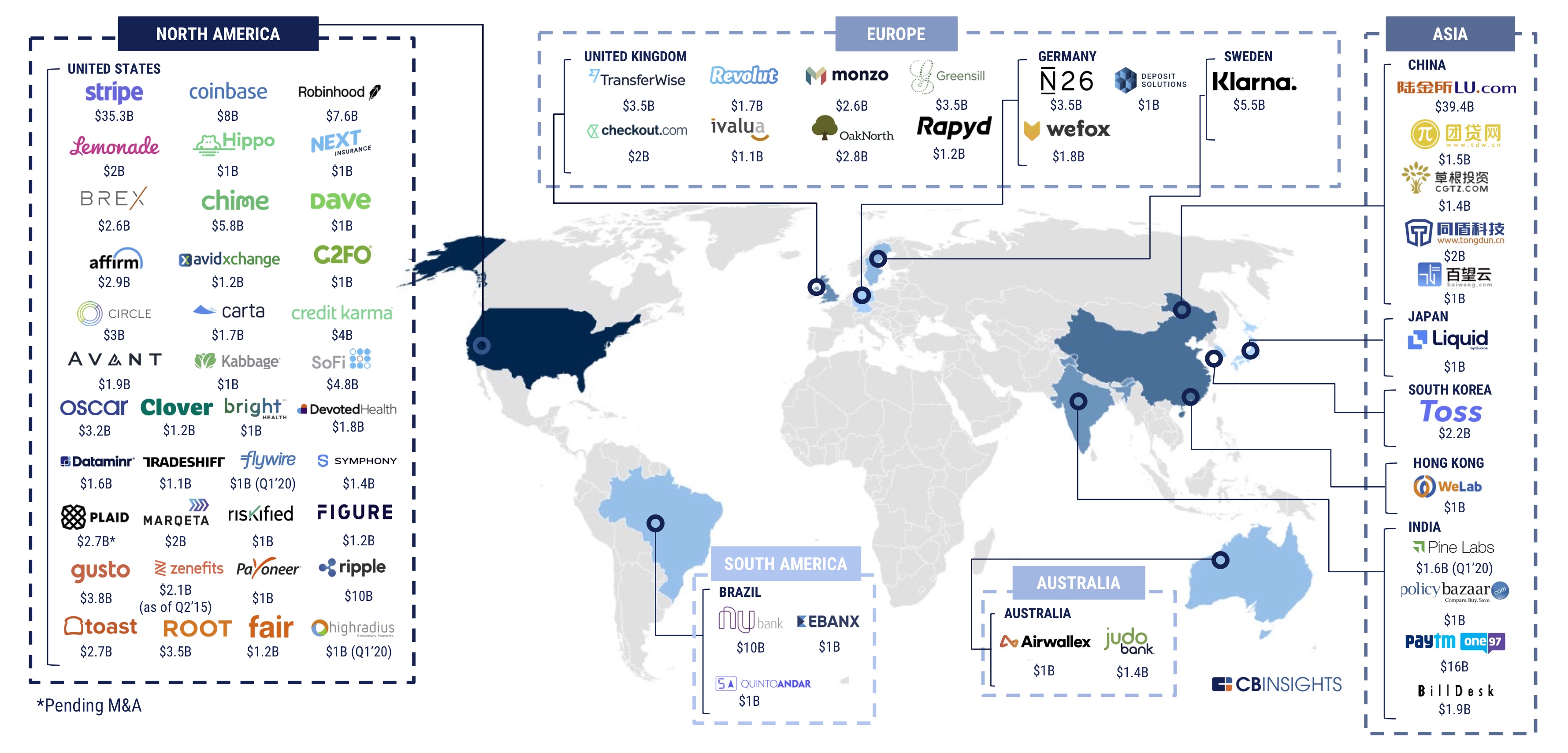
The fintech market globally today has 67 unicorns as of earlier this month (CB Insights)
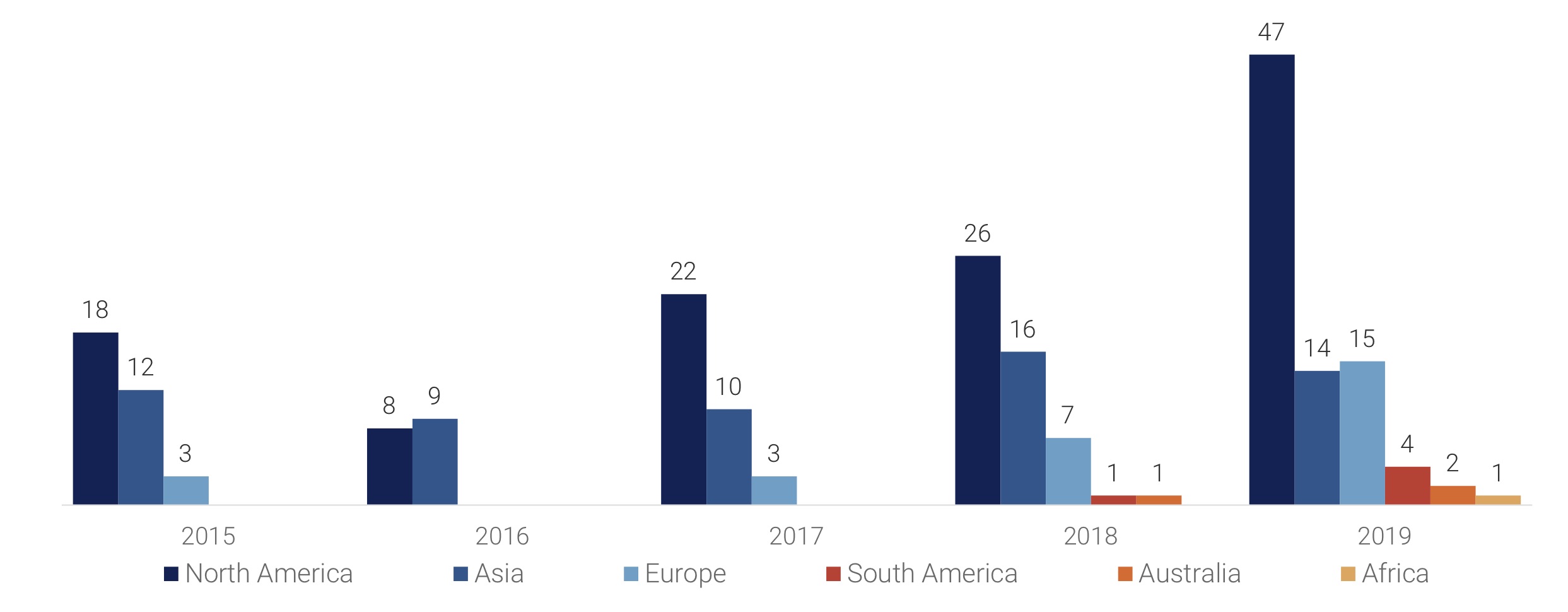
2019 saw 83 mega-rounds totaling $17.2B, a record year in every market except Europe
*CB Insights report includes a $666 million financing round of Paytm . It was incorrectly reported by some news outlets and the $666 million raise was part of the $1 billion round the Indian startup had revealed weeks prior. We have adjusted the data accordingly.
Powered by WPeMatico
DSP Concepts — a startup whose Audio Weaver software is used by companies as varied as Tesla, Porsche, GoPro and Braun Audio — is announcing that it has raised $14.5 million in Series B funding.
The startup goal, as explained to me by CEO Chin Beckmann and CTO Paul Beckmann (yep, they’re a husband-and-wife founding team), is to create the standard framework that companies use to develop their audio processing software.
To that end, Chin told me they were “picky about who we wanted on the B round, we wanted it to represent the support and endorsement of the industry.”
So the round was led by Taiwania Capital, but it also includes investments from the strategic arms of DSP Concepts’ industry partners — BMW i Ventures (which led the Series A), the Sony Innovation Growth Fund by Innovation Growth Ventures, MediaTek Ventures, Porsche Ventures and the ARM IoT Fund.
Paul said Audio Weaver started out as the “secret weapon” of the Beckmanns’ consulting business, which he could use to “whip out” the results of an audio engineering project. At a certain point, consulting customers started asking him, “Hey, how about you teach me how to use that?,” so they decided to launch a startup focused on the Audio Weaver platform.

Paul described the software as a “graphical block diagram editor.” Basically, it provides a way for audio engineers to combine and customize different software modules for audio processing.
“Audio is still in the Stone Ages compared to other industries,” he said. “Suppose you’re building a product with a touchscreen — are you going write the graphics from scratch or use a framework like Qt?”
Similarly, he suggested that while many audio engineers are still “down in the weeds writing code,” they can take advantage of Audio Weaver’s graphical interface to piece everything together, as well as the company’s “hundreds of different modules — pre-written, pre-tested, pre-optimized functions to build up your system.”
For example, Paul said that by using the Audio Weaver platform, DSP Concepts engineers could test out “hundreds of ideas” for algorithms for reducing wind noise in the footage captured by GoPro cameras, then ultimately “hand the algorithms over to GoPro,” whose team could them plug the algorithms into their software and modify it themselves.
The Beckmanns said the company also works closely with chip manufacturers to ensure that audio software will work properly on any device powered by a given chipset.
Other modules include TalkTo, which is designed to give voice assistants like Alexa “super-hearing,” so that they can still isolate voice commands and cancel out all the other noise in loud environments, even rock concerts. (You can watch a TalkTo demo in the video below.)
DSP Concepts has now raised more than $25 million in total funding.
Powered by WPeMatico
Amazon may have a market cap of more than $1 trillion, but Finbarr Taylor, CEO of Y Combinator-backed startup Shogun, said the e-commerce giant is “kind of dropping the ball.”
Specifically, he argued that the experience of shopping on Amazon — not what happens after you buy something, but browsing the website itself — is pretty bad, full of sponsored results and fake products.
“What we’re seeing happen is that all this vast wave of direct-to-consumer brands is nibbling around edges of Amazon and beating them on buying experience,” Taylor said.
Shogun was designed to support those brands. Taylor and his co-founder Nick Raushenbush created the first product in 2015, and they treated it as a side project at first. But Taylor said that by May 2017, “It ate up all of our free time and it was obviously much bigger than we expected,” so they quit their jobs (Taylor was working as a software engineer at Y Combinator) and devoted themselves to it full-time.
The company now has 11,000 customers, including MVMT, K-Swiss and Leesa. And today, Shogun is announcing that it has raised a $10 million Series A, led by Initialized Capital, with participation from VMG Partners and YC. (The startup has now raised a total of $12 million.)
The company’s first product, Page Builder, offers a drag-and-drop interface to make it easier for e-commerce brands to build their storefronts on Shopify, BigCommerce, Salesforce and Magento.
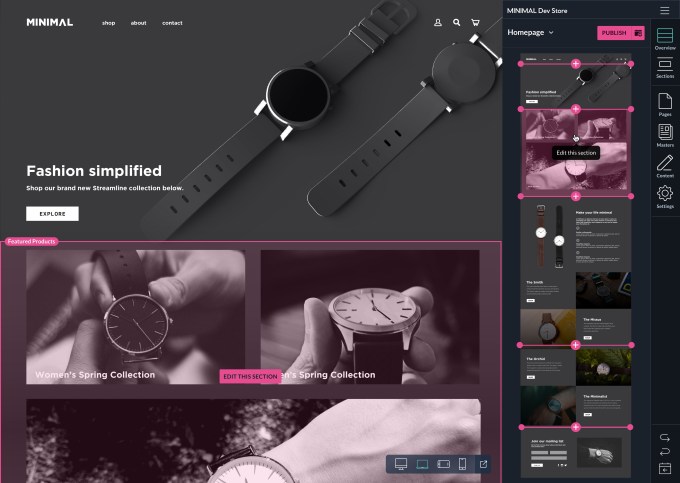
And there’s a new product, Shogun Frontend, which allows brands to create a web storefront that’s entirely customized while still using one of the big commerce platforms as their back end.
Taylor pitched this as part of a broader trend toward “headless commerce,” where the e-commerce front end and back end are handled separately. He suggested that this is a “mutually beneficial” split, as Shopify and its competitors are going “super deep” on building the infrastructure needed to operate a store online, while Shogun focuses on the actual experience of the customer visiting that store.
Meanwhile, website builders like Squarespace and Weebly (owned by Square) have introduced e-commerce features, but Taylor suggested that they’re still “not really a professional choice” for most e-commerce businesses.
As one of the key features of Shogun Frontend, Taylor pointed to the fact that it creates progressive web apps that should be as fast and smooth as a native app.
Brett Gibson, general partner at Initialized Capital and a Shogun board member, made a similar point in a statement:
For DTC brands competing against goliaths like Amazon, Shogun Frontend now gives them features and capabilities once only reserved for enterprise companies. And when it comes to speed, Shogun Frontend’s sub-second load time is the critical difference between retaining or losing a customer.
Taylor added that the company will be “continuing to invest in Page Builder too,” but he suggested that Frontend is “more of an enterprise offering” that can help Shogun’s biggest customers “future proof themselves.”
Powered by WPeMatico
Ordway, a Washington, DC startup, is building a platform to deal with all of the stuff that happens after you make sale. It starts with the order and goes all the way to revenue as a one-time payment or recurring subscription. Today the company announced a $10 million Series A.
CRV led the round with participation from Clocktower Ventures and existing investors Lerer Hippeau and Revolution Rise of the Rest fund. The company has now raised a total of $12.5 million, according to Crunchbase data.
Sameer Gulati, founder and CEO at Ordway, says the company wanted to build a flexible tool to sit between the CRM and financial systems of a company. “So in that sense, we do everything for post-sales from billing automation, payment collection, revenue recognition, analytics, all the way to cash. We have a streamlined workflow for managing order to revenue,” Gulati told TechCrunch.
It sounds a lot like the Quote-to-Cash space where companies like Apttus (acquired by Thoma Bravo in 2018) or SteelBrick (acquired by Salesforce in 2015) tried to stake a claim, but Gulati says while his company’s solution handles the quote-to-cash workflow, it can do much more than that.
“We absolutely can handle the workflow from quote to billing to payments to revenue, for sure. But the reason Ordway has a niche is because we are a lot more configurable and a lot more flexible to accommodate any workflow out there,” he said.
He says his company’s solution connects to the CRM system on one side and the financial systems on the other. They are compatible with all the major CRM tools including Salesforce and Dynamics 365. And they support a range of financial tools like NetSuite or QuickBooks.
“In fact, we can work with any back-end small system to a large scale ERP system, but our value add is automating the movement of data into the ERP. So we are the operational framework between sales and traditional ERP. We will handle everything in between,” he said.
As for the funding, Gulati has the kind of plans you would expect with a Series A investment. “The core goal is definitely to accelerate all aspects of our business from sales and marketing to product and engineering, and most importantly, customer success. Basically, in a sense we are doubling down on making sure our customers are successful in solving their core sales to finance business challenges,” he said.
The company launched in 2018 and has 25 employees today. Gulati says his company’s goal is to grow 4x in the next 12 months and grow employees at a similar rate.
Powered by WPeMatico
“I don’t feel good about that. That sucks,” Chrys Bader-Wechseler reflects when asked about the bullying that went down on the anonymous app Secret he co-founded in 2013. After $35 million raised, 15 million users and a spectacular flame out two years later, the startup was dead. “Since I left Secret I feel alive and aligned with my values and my purpose again.”
But there was one bright side to Secret letting you post without a name or consequences. People opened up, got vulnerable and felt less alone when comments revealed they weren’t the only person dealing with a certain struggle. What Bader learned from watching Secret’s users “do this in the dark” was the realization that “actually, we need to learn to do this in the light, to have that same kind of dialogue, but do it openly with each other.”
So began the journey to Bader’s new startup Ikaria that’s exclusively revealing itself to the world today on TechCrunch. It’s a different kind of chat app, named after the Greek island where a close-knit community helps extend people’s lifespans. The six-person Santa Monica team is funded by a $1.5 million seed round led by Initialized Capital and Fuel Capital. People can sign up for early beta access here.

During a long interview about the startup, Bader and his co-founder Sean Dadashi were cagey about exactly how Ikaria works, as it’s still in development. Amidst all the philosophical context about the app’s intention, I was able to pull out a few details about what the product will actually look like.
“Basically, since 2004, technology has created this monumental shift in the human social experience. We’re more connected than ever technically but all the studies show we’re lonelier than ever,” Bader explains. “It’s like eating McDonald’s to get healthy. It’s not the right source of nutrition for our social well-being because true connection requires a level of vulnerability, presence, self-disclosure and reciprocity that you don’t really get on these platforms.”
Ikaria isn’t another feed. It’s a safe space where you can chat with close friends and family, or people going through similar life challenges. Members of these group chats will optionally go through guided experiences that help them reflect on and discuss what’s going on in their hearts and minds. This could become a whole new media format where outside creators or mental health professionals could produce and contribute their own guided experiences.
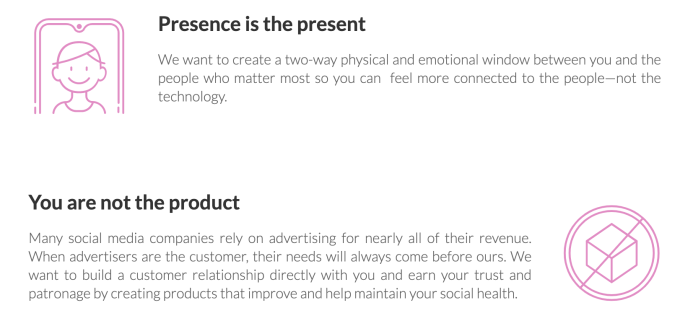
“Part of the reason we’re announcing this is that . . . it’s a call to action to involve all these practitioners and people who are doing these types of things and giving them a platform to allow them to facilitate these kind of group bonding experiences through a platform where they can extend their practices into the digital world,” Bader tells me. What Calm and Headspace did for making meditation more mainstream and accessible, Ikaria wants to do for mental health through online togetherness.
Ikaria already has a sizable closed beta going, which the startup plans to continue until it finds product fit, and it hopes to know its official release timeline by the end of the year. “We’re not going to launch this until we know 40% of people would be disappointed if they couldn’t use it.”
Rather than monetizing by exploiting people’s attention, Ikaria plans to develop a “customer relationship” with users, which could mean subscription access or in-app payments for buying content. Perhaps one user could act as the sponsor and purchase an experience for their whole group chat. Until then, it’s got its seed funding from Initialized, Fuel Capital, F7 Ventures, Ryan Hoover’s Weekend Fund, Backend Capital, Day One Ventures, Shrug, Todd Goldberg and Superhuman’s Rahul Vohra.
“The hope is that eventually this would be an app you use instead of iMessage, to increase your sense of presence,” Bader explains, revealing its grand ambitions. Why would we need to replace our core chat apps? Well for one thing, they don’t understand who really matters to you. If an app understood who your mom is, it could give her messages special prevalence or remind you to contact her.

Bader met Dadashi through an offline men’s group for discussing life, love and everything in the wake of Secret’s collapse and a rough romantic breakup. After just a few weeks of these meetups, they say they felt closer to each other than to most of their friends. Only later did Bader, a designer by trade, discover that Dadashi was a coder who’d been CTO of electronics company MHD Enterprises before starting a travel and lifestyle startup for mental wellness, called Somatic Studios. They tried working together on an app for sharing quotes from your friends but scrapped it.
Together, the pair went on to research the rapid rise of other vulnerability-focused meetup organizations like the one where they met, including Evryman, ManKind Project, Quilt, Authentic Relating, Circling, and T-Groups. Though they knew that to have a chance at impact at scale, they’d need to build a mobile app familiar enough to get people over the hurdle of starting a mindfulness practice. They laid out a few principles to build by: a focus on relationships instead of Likes and followers, conscious design that won’t exploit people’s attention or weaknesses, no ads, and keeping all data private and in control of the user.

There are other startups hoping to address the sad state of mental health from different angles. Talkspace offers a mobile connection to licensed therapists, though it can be pricey at $65 to $99 per week. 7 Cups and TalkLife makes peer-to-peer counseling from volunteers free, though these aren’t professionals. There are also plenty of journaling products, gratitude practice apps and wellness podcasts out there. But Ikaria’s approach, combining mental health content with group chats of people you trust, feels unique.
Having known Bader since the Secret days, it’s obvious that working with Dadashi has made him happier and more centered. Ikaria is an app he can wake up feeling good about each day. “You know, I don’t like to speak ill of David [Byttow, Secret’s CEO who sources say was verbally abusive to employees], but that relationship was very, very toxic and taxing for me. And this time around with Sean, as I’m sure you can tell, is the polar opposite.”
If Ikaria can help people develop the open and honest relationships with friends or peers like building it has done for Bader and Dadashi, it could be a beacon amidst a sea of time unwell spent.
Powered by WPeMatico